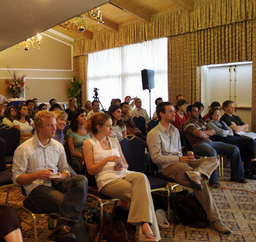International Congress on Default Mode Network
and other intrinsic networks in health and disease
Can Massallera, Sant Boi de Llobregat
Barcelona
4-5 June 2010
Dear colleagues:
We are pleased to announce a forthcoming conference:
Default Mode Network and other intrinsic networks in health and disease
Default Mode Network and other intrinsic networks in health and disease
The last decade has seen important advances in functional brain imaging. As part of these, since 2001 there has been growing interest in default mode network, a series of interconnected brain regions which are highly active at rest but de-activate during performance of many cognitive tasks. This network appears to have important functions related to self-directed thought and is being increasingly implicated in disorders such as dementia, schizophrenia and affective disorder.
This meeting will take place in Barcelona on the 4th and 5th of June. It will bring together leading researchers on the default mode network, and will provide a forum for sharing the latest information on the rapid evolving knowledge in the field. There will be keynote speeches from Marcus Raichle and Michael Greicius, and sessions will be devoted to recent advances in understanding of the default mode network, changes across the lifespan (including aging and age-related neurodegenerative disorders), and the default mode network in a range of psychiatric disorders. Connectivity and other brain networks will be also part of the programme.
| This meeting will take place in Barcelona on the 4th and 5th of June. It will bring together leading researchers on the default mode network, and will provide a forum for sharing the latest information on the rapid evolving knowledge in the field. There will be keynote speeches from Marcus Raichle and Michael Greicius, and sessions will be devoted to recent advances in understanding of the default mode network, changes across the lifespan (including aging and age-related neurodegenerative disorders), and the default mode network in a range of psychiatric disorders. Connectivity and other brain networks will be also part of the programme. The conference takes place immediately before the Human Brain Mapping Conference in Barcelona and will be an official satellite of this meeting. |













 development efforts? Does your company embrace Translational Medicine inherently, adopt it with broad brush strokes because it is in vogue or ignore it altogether?
development efforts? Does your company embrace Translational Medicine inherently, adopt it with broad brush strokes because it is in vogue or ignore it altogether?